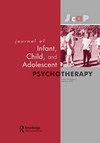看护者心理情感与儿童防御机制的关系研究
Q3 Psychology
Journal of Infant, Child, and Adolescent Psychotherapy
Pub Date : 2021-10-02
DOI:10.1080/15289168.2021.1999193
引用次数: 0
摘要
心理情感是指从过去和现在的情境中评估和调节个人情绪的能力。防御机制是一种无意识的心理策略,用来保护一个人免受由不可接受的想法或感觉引起的焦虑。本研究探讨照顾者心理情感与儿童防卫机制的关系。研究招募了在低收费门诊心理健康诊所接受神经心理学评估或个人心理治疗的儿童(N = 24对)。照顾者完成了简短心理情感量表(BMAS),这是一份包含12个项目的自我报告问卷,用于评估心理情感的三个组成部分:情绪的识别、处理和表达。儿童完成主题统觉测验(TAT);回答是根据克莱默防御机制手册进行编码的。分析结果与假设一致,即否认在较小的年龄(8岁)更普遍。在8岁以上的儿童中,较低的照顾者心理情感与儿童更原始的防御使用(即拒绝)显著相关。尽管研究结果存在局限性,但该探索性研究的结果对护理人员-儿童治疗干预具有重要意义,并且随着样本量的增加,值得进一步检查。本文章由计算机程序翻译,如有差异,请以英文原文为准。
Examining the Relationship between Caregiver Mentalized Affectivity and Childhood Defense Mechanisms
ABSTRACT Mentalized affectivity is the ability to draw from prior and present contexts to evaluate and modulate one’s emotions. Defense mechanisms are unconscious psychological strategies used to protect a person from anxiety arising from unacceptable thoughts or feelings. The present study explores the relationship between caregivers’ mentalized affectivity and children’s defense mechanisms. Children who underwent a neuropsychological assessment or an individual psychotherapy intake at a low-fee outpatient mental health clinic were recruited (N = 24 dyads). Caregivers completed the Brief Mentalized Affectivity Scale (BMAS), a 12-item self-report questionnaire to assess three components of mentalized affectivity: identifying, processing, and expressing of emotions. Children completed the Thematic Apperception Test (TAT); responses were coded based on Cramer’s Defense Mechanism Manual. The findings of the analysis are consistent with the hypothesis that denial is more prevalent at younger ages (<8 years), while identification is more common in latency and adolescence (>8 years). Among children older than 8 years old, lower caregiver mentalized affectivity was associated with significantly more primitive defense use (i.e., denial) on the part of the child. Although there were limitations to the findings, results from this exploratory study have important implications for caregiver-child therapeutic interventions and warrant further examination as the sample size grows.
求助全文
通过发布文献求助,成功后即可免费获取论文全文。
去求助
来源期刊

Journal of Infant, Child, and Adolescent Psychotherapy
Psychology-Clinical Psychology
CiteScore
1.70
自引率
0.00%
发文量
37
 求助内容:
求助内容: 应助结果提醒方式:
应助结果提醒方式:


